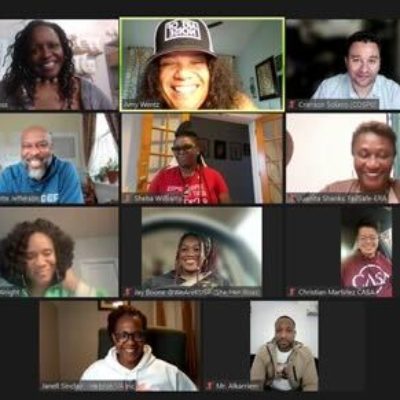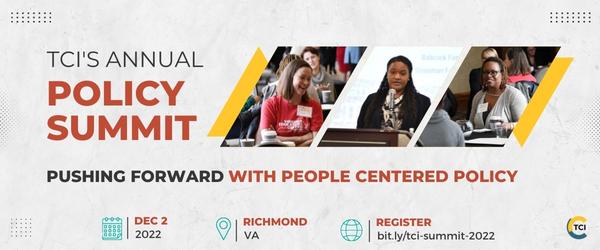
I hope that you and your family had a restful Thanksgiving and were able to enjoy some respite before the end-of-year preparations and hustle.
Here at TCI, we are looking forward to hosting our annual Policy Summit this Friday, December 2. We’re excited to be back together in person to talk about exciting policy updates, learn from each other, and strengthen our voices for future advocacy. This event is critical in our preparation for the 2023 legislative session.
With a divided legislature and a short session, every moment of the legislative session is important. So we’re preparing to leverage every opportunity on key issues like education and tax policy and fight any attempts to roll back the progress that we’ve made together over the past few years.
Read more about everything that is going on at TCI below. We look forward to working with you to advance solutions that work in the 2023 legislative session and beyond.

Ashley C. Kenneth
President & CEO, The Commonwealth Institute
P.S. In addition to the great resources in the rest of this newsletter, we hope that you will join us for our annual Policy Summit. You can register at bit.ly/tci-summit-2022
Collective Work for Our Collective Future
This fall has been full of exciting new work for TCI, driven by our values to advance racial and economic justice in Virginia and focusing on solutions that work. To that end, we helped launch Collective Work, a coalition of grassroots organizations focused on racial and economic justice and whose name comes from the Kwanzaa principle Ujima. Ujima teaches us to recognize that our own well-being is derived from our family and communities’ well-being and that we must be concerned with the overall health of our family and community — that the lives of each family member and that of the community are bound together.
The coalition is organized around the following principles:
- Forging New Partnerships: Partnering with Black-led organizations and/or smaller, less resourced organizations that are embedded in communities of color in order to amplify new voices that should be centered in decision making.
- Resourcing Partner Organizations: Providing significant funding to each coalition partner and serving as a thought partner to ensure organizations are able to build sustainable processes to increase outreach and engagement within their communities.
- Sharing Learning and Prioritization: Creating opportunities and/or an outlet for directly impacted individuals to express concerns and share their lived experience which fosters an environment conducive to learning from one another. This includes peer learning as well as training on specific issues.
- Civic Engagement and Power Building: Providing opportunities for coalition members to drive civic engagement work with tactical and strategic support to further coalition priorities.

Collective Work recently had their first full coalition meeting. TCI’s Director of Outreach and Engagement (top center), Amy Wentz, has been engaging and onboarding coalition partners since June.
The launch of this coalition was made possible with support from the Richmond Memorial Health Foundation as part of an investment to advance health and racial equity in the greater Richmond area. As we build and support inclusive systems of justice and opportunity in Virginia, Collective Work will help to inform TCI’s policy priorities and amplify new voices in the debates about Virginia’s future.
Preparing for Critical Conversations in 2023
Our community engagement is already informing our policy agenda for the upcoming legislative session, with bold new policy initiatives like creating a state child tax credit (CTC) in Virginia, an idea borne out of deep listening and collaboration with partners like Families Forward Virginia. Creating an inclusive CTC — not restricted by immigration status or whether a person has earned income — would likely provide a substantial income boost to families led by mothers in particular and to families of color, especially Black and Latinx families, and help address gender and racial income disparities that result from barriers to employment, education, and other areas. A state CTC is a smart tax policy choice that could provide more targeted support for families with children while preserving resources to invest in our communities.
If you’ve been following the news out of Richmond recently, it’s clear that this upcoming legislative session will likely be dominated by conversations about tax policy and education.
Virginia public schools are the backbones of our communities. Schools in Virginia and across the country have faced unique challenges over the past few years dealing with lost learning time and mental health challenges. While Virginia, like the majority of states, has seen test scores fall over the past few years, many of Virginia’s students are doing well despite the tremendous challenges of the past few years thanks to the hard work of students, teachers, and parents. The state, however, is not doing its part.
Instead of attacking our schools and our teachers, Gov. Youngkin and legislative leaders should put forward plans to provide public schools the resources they need to provide a high-quality education for every student in every zip code. Recent investments do not make up for the fact that Virginia schools have been historically underfunded and rank 41 in the country for per-student funding. This next legislative session, it should be Virginia’s number one priority to fully fund our schools so that they can hire the teachers and counselors that our students need.
While localities have gone above and beyond with funding, in part to make up for the state’s lack of support, a key component to achieve a safe, healthy, and supportive environment for staff and students is for local school boards to allow teachers and school staff to collectively bargain. By joining together to speak with a more powerful voice, collective bargaining can raise teacher and staff pay, increase retention, improve working conditions, and boost teacher morale. When teachers and school staff have a voice on the job, the overall impact is good for workers, students, and the community. Because of your support, we were able to detail the benefits of collective bargaining for teachers and school staff in our recent report, “Collective Bargaining: A Critical Tool to Improve School Staffing, Pay, and Morale.”
Join us at our Policy Summit this Friday to learn more about Virginia’s Role in Creating Great Schools for Every Student and many other issues. Register today at bit.ly/tci-summit-2022.
…Shaped by Credible, Accessible Research.
TCI’s community engagement is complemented by our research and analysis to advance solutions that work. Recently, TCI’s work has been strengthened by the addition of new staff who have been critical to TCI’s work to advance people-centered policy.

Mel Borja is TCI’s Worker Power Policy Analyst. She has been instrumental in building and strengthening relationships with labor unions and supporting Virginia’s powerful tradition of working people coming to together for workers’ rights through critical research and mapping Virginia’s labor history.

Megan Davis serves as our new Tax and Budget Policy Analyst working in tandem with our Revenue Campaign Manager, Rodrigo Soto, to build upon the momentum of improving Virginia’s Earned Income Tax Credit (EITC) earlier this year and leading research on enacting a state Child Tax Credit (CTC).

Emily King is a Senior Policy Analyst and leads our Decriminalization of Poverty Campaign. Building upon previous experience in the Governor’s office and the Department of Behavioral Health and Developmental Services, Emily will continue to expand TCI’s leadership on this campaign, strengthen partnerships, and augment our legislative advocacy.
Throughout the last few years, we have seen that effective public policy plays a vital role in supporting communities across the state, and we have seen the power of advocates to advance effective solutions in a divided government. Our theme for this year’s Policy Summit, “Pushing Forward with People-Centered Policy,” resonates year round and will continue to guide our work in the future.
Together, we will continue to make plain what and who is at risk if we do not center equity in policymaking, and work with partners and community to lay the foundation for transformational change.
Thank you for your continued support!
